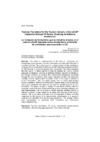Please use this identifier to cite or link to this item:
https://accedacris.ulpgc.es/jspui/handle/10553/136217
| DC Field | Value | Language |
|---|---|---|
| dc.contributor.author | Clouet, Richard | en_US |
| dc.date.accessioned | 2025-02-14T15:17:24Z | - |
| dc.date.available | 2025-02-14T15:17:24Z | - |
| dc.date.issued | 2024 | en_US |
| dc.identifier.issn | 1579-9794 | en_US |
| dc.identifier.uri | https://accedacris.ulpgc.es/handle/10553/136217 | - |
| dc.description.abstract | This work is contextualised in the field of Translation and Interpreting, more precisely in tourism translation, and falls within the area of translator training. The study is part of a larger project on the adoption of strategies for the acquisition of intercultural communicative competence (ICC) by T&I students in second language (L2) classrooms. The article examines how the use of TV series can be an effective method not only to improve language competence, but also to enhance learners’ general knowledge of the foreign culture(s); to develop their intercultural awareness, especially through the use of subtitles (both same-language subtitles and translated subtitles); and to improve their translation skills, in this case, in relation to tourism translation. Thus, this paper argues that TV series help develop trainee translators’ intercultural awareness, prepare them to be professional intercultural mediators and they can be used as parallel texts for tourism translation. The paper includes a sample of task-based activities that can empower future translators in the tourism industry to overcome ambiguity and misunderstandings, and to achieve a fruitful dialogue between people of different cultures−a key aspect to be taken into account in the tourism industry. The study finally concludes with an evaluation of these activities supported by the results of a questionnaire administered to a group of students who benefited from the learning experience. The findings confirm their effectiveness in improving both translation and intercultural communication skills. | en_US |
| dc.description.abstract | Este trabajo está contextualizado en el ámbito de la Traducción e Interpretación, más precisamente en la traducción turística, y se enmarca en el área de la formación de los traductores. El estudio forma parte de un proyecto más amplio sobre la adopción de estrategias para la adquisición de la competencia comunicativa intercultural (CCI) por parte del estudiantado de TeI en las aulas de segundas lenguas (L2). El artículo examina cómo utilizar las series de televisión como método eficaz no solo para mejorar la competencia lingüística, sino también para potenciar el conocimiento general de los estudiantes sobre la(s) cultura(s) extranjera(s); desarrollar su conciencia intercultural, especialmente mediante el uso de subtítulos (tanto subtítulos en la misma lengua como subtítulos traducidos); y mejorar sus competencias traductológicas, en este caso, en relación con la traducción turística. Así pues, este trabajo sostiene que las series de televisión ayudan en el desarrollo de la conciencia intercultural de los traductores en formación, los preparan para ser mediadores interculturales profesionales y que se pueden usar como textos paralelos para la traducción turística. El trabajo incluye una muestra de actividades basadas en tareas que pueden capacitar a los futuros traductores de la industria turística para superar la ambigüedad y los malentendidos, y para lograr un diálogo fructífero entre personas de diferentes culturas, lo cual constituye un aspecto clave en la industria turística.Finalmente, el estudio concluye con una evaluación de estas actividades, apoyada en los resultados de un cuestionario entregado a un grupo de estudiantes que se beneficiaron de la experiencia de aprendizaje. Los hallazgos confirman su efectividad en la mejora tanto de las habilidades de traducción como de comunicación intercultural. | en_US |
| dc.language | eng | en_US |
| dc.relation.ispartof | Hikma | en_US |
| dc.source | Hikma: Revista de traducción [ISSN 1579-9794, eISSN 2445-4559], v. 23, n. 3 | en_US |
| dc.subject | 570112 Traducción | en_US |
| dc.subject | 580107 Métodos pedagógicos | en_US |
| dc.subject | 570111 Enseñanza de lenguas | en_US |
| dc.subject.other | Tourism translation | en_US |
| dc.subject.other | TV series | en_US |
| dc.subject.other | Intercultural communicative competence | en_US |
| dc.subject.other | Second language acquisition | en_US |
| dc.subject.other | Task-based activities | en_US |
| dc.subject.other | Traducción turística | en_US |
| dc.subject.other | Series de televisión | en_US |
| dc.subject.other | Competencia comunicativa intercultural | en_US |
| dc.subject.other | Adquisición de segundas lenguas | en_US |
| dc.subject.other | Actividades basadas en tareas | en_US |
| dc.title | La formación de traductores para la industria turística en el aula de L2/LSP mediante series de televisión El fomento de actividades para desarrollar la CCI | en_US |
| dc.title.alternative | Training Translators for the Tourism Industry in the L2/LSPClassroom through TV Series: Fostering Activities to Develop ICC | en_US |
| dc.type | info:eu-repo/semantics/article | en_US |
| dc.type | Article | en_US |
| dc.identifier.doi | https://doi.org/10.21071/hikma.v23i3.16980 | en_US |
| dc.investigacion | Artes y Humanidades | en_US |
| dc.type2 | Artículo | en_US |
| dc.description.numberofpages | 33 | en_US |
| dc.utils.revision | Sí | en_US |
| dc.identifier.ulpgc | Sí | en_US |
| dc.contributor.buulpgc | BU-HUM | en_US |
| dc.description.sjr | 0,281 | |
| dc.description.sjrq | Q1 | |
| dc.description.dialnetimpact | 0,0 | |
| dc.description.dialnetq | Q3 | |
| dc.description.miaricds | 7,8 | |
| dc.description.erihplus | ERIH PLUS | |
| item.grantfulltext | open | - |
| item.fulltext | Con texto completo | - |
| crisitem.author.dept | GIR Traducción e Interpretación, Interculturalidad, Lenguas Aplicadas y Literatura de Viajes | - |
| crisitem.author.dept | Departamento de Filología Moderna, Traducción e Interpretación | - |
| crisitem.author.orcid | 0000-0003-0727-1260 | - |
| crisitem.author.parentorg | Departamento de Filología Moderna, Traducción e Interpretación | - |
| crisitem.author.fullName | Clouet, Richard | - |
| Appears in Collections: | Artículos | |
Items in accedaCRIS are protected by copyright, with all rights reserved, unless otherwise indicated.
